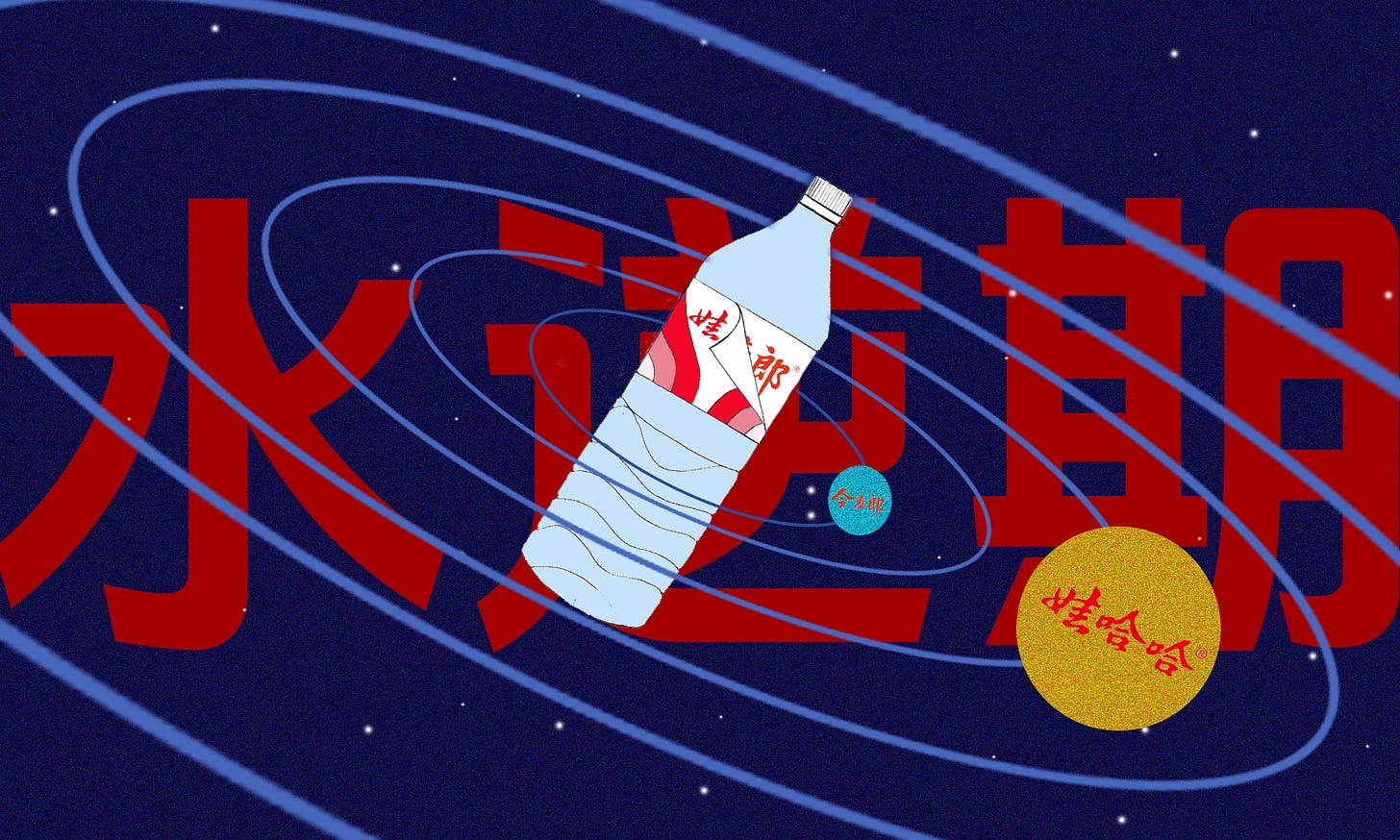Welcome to RealTime Mandarin, a free weekly newsletter that helps you improve your Mandarin in 10 minutes a week.
Subscribe today to get your fluency back, stay informed about China, and communicate with confidence in Chinese — all through immersion in real news.
In early May, images of Wahaha (哇哈哈) bottled water began circulating on Chinese social media.
Photos revealed the fine print on bottle labels, which showed how they were produced by another drinks brand, Jinmailang (今麦郎).
"I’ve always bought Wahaha purified water, but this time the bottle felt a bit different.
On closer inspection, I was shocked to find it was made by Jinmailang."
"一直喝娃哈哈纯净水,这次买的水拿到手感觉包装风格有点不一样,仔细一看生产商居然是今麦郎,瞬间感觉很诧异。"
Jinmailang's products are significantly cheaper than Wahaha branded mineral water, prompting the obvious question:
"Why not just buy Jinmailang directly?"
我为什么不直接购买今麦郎?
Jinmailang is a major player in China’s bottled water market, and a well known brand.
First established as a food business in 1994, its beverage business was set up in 2006. Jinmailang now sells over 12 billion bottles of mineral water annually including its own brands like Blue Label Water, Liangbaikai, and Jinkuang; and it sold around 1.2 billion bottles to Wahaha last year alone.
Outsourcing is a common practice in China's beverage industry, where companies often engage “OEMs” (Original Equipment Manufacturers) to produce their products. But typically these partnerships are with non-competing manufacturers. The controversy surrounding Wahaha’s OEM relationship with Jinmailang (今麦郎) is because it’s a direct competitor in the bottled water market.
As public attention intensified, Wahaha issued a statement acknowledging the collaboration, but revealed the partnership with Jinmailang ended in April 2025, due to "internal quality checks which found that certain batches had failed post-production sampling tests."
Related
Competition in China’s bottled water market is intense.
Major brands like Nongfu Spring (农夫山泉), Wahaha, Master Kong, and Jinmailang all compete for market share, while retail brands such as Meituan, and JD’s 7Fresh have also launched their own low price bottled water brands.
Despite this stiff competition, Wahaha has experienced a resurgence over the last year, following the death of its founder, Zong Qinghou (宗庆后), in March 2024, when customers began buying its water again to show sympathy for Zong, and for the brand which millions of people in China associate with their childhood memories (童年回忆).
Its total market share in bottled water grew from 4% in February 2024 to a staggering 20% in just three months. By January this year, it still held onto over 16% of the market. The company’s total revenue surpassed 70 billion yuan ($9.7 billion dollars) in 2024, marking a 40% year-on-year increase.
With Zong Qinghou's passing, his daughter Zong Fuli (宗馥莉) took over the company. Since then, despite the impressive sales performance, Wahaha has faced internal challenges, including factory closures, employee disputes, and significant restructuring of its distribution system—all part of a wider campaign by its new boss to modernise the company.
Zong Fuli has initiated a sweeping overhaul of management and operations, sidelining veteran executives, and phasing out the traditional "joint sales system" (联销体), developed by founder, Zong Qinghou.
Once a cornerstone of the company’s success, Wahaha's “joint sales system” is now viewed as too rigid to meet modern consumer demands. Its decades-old network of vested interests within the distributor network and supply chain also poses risks of corruption and resistance to change.
That’s why some describe Zong Fuli as “the Zhēn Huán of the beverage industry” (饮料圈甄嬛), drawing a parallel to the character from the Chinese drama, Empresses in the Palace (甄嬛传). In the series, Zhen Huan navigates the complex and often perilous dynamics of the imperial palace, eventually ascending to become its most powerful figure.
Similarly, Zong Fuli is steering Wahaha through significant internal changes, dismantling entrenched interests, and transforming the company amidst evolving market dynamics.
Industry insiders believe Wahaha's internal reforms, particularly the closure of several factories, led to the need to outsource production to Jinmailang (今麦郎). Facing supply constraints amid rising demand over the past year, Wahaha had no choice but to turn to its competitor to make up the shortfall of over a billion bottles of water.
It’s a high stakes strategy, but one which could pay off for Zong Fuli, as one industry observer notes:
Her "iron-fisted reforms" are akin to a high-stakes gamble—if she wins, Wahaha will be revitalised.
If she loses, this brand that is part of many people’s "childhood memories" may truly become just memories.
她的“铁腕改革”像一场豪赌——赌赢了,娃哈哈重焕青春;赌输了,“童年回忆”可能真成回忆了。[3]
That’s what we’re exploring this week!
🎧RTM Podcast Preview
This week on the RTM Advanced podcast, we're unpacking metaphors involving “water” in the discussions about this story:
“Mercury retrograde” (水逆期 shuǐ nì qī)—colloquially used to describe times of bad luck
"Come to the surface" (浮出水面 fú chū shuǐ miàn)—when something becomes evident or comes to light
"Not a drop of water leaks" (滴水不漏 dī shuǐ bù lòu)—refers to watertight arguments or plans
Tune in at 8 minutes where we break down what they mean, how native speakers use them, and how you can use them in real conversations.
Favourite Five
1. 变味 biàn wèi
lose its original flavour, change for the worse
宗馥莉时代的娃哈哈,是不是变了味 – Has Wahaha changed for the worse under Zong Fuli’s leadership? [1]
Note: a subtle play on words here, "the “flavour” of the water is different.
2. 水逆期 shuǐ nì qī
Mercury Retrograde Period; a period of bad luck
在2024年成功爆红逆袭的娃哈哈,到了2025年似乎进入“水逆期”,各种风波不断 – After Wahaha made a surprising comeback in 2024, it seemed to hit a streak of bad luck in 2025, with one crisis after another.
More: We explain the background of this internet slang, and it’s other-worldly origin, in tomorrow’s Sinica Phrase of the Week.
3. 爱惜羽毛 ài xī yǔ máo
protect one’s reputation
有人认为娃哈哈太不珍惜羽毛,这么做会毁掉品牌价值 – Some believe Wahaha is destroying its reputation, and that this approach could tarnish its brand image. [3]
Note: here, in context, the phrase is changed to 珍惜羽毛, which basically means the same thing, although less conventional!
4. 浮出水面 fú chū shuǐ miàn
come to light, surface
随着更多的诡异信息浮出水面,围绕娃哈哈代工仍有不少疑问待解 – As more strange information comes to light, many questions about Wahaha’s contract manufacturing remain unanswered. [4]
5. 众矢之的 zhòng shǐ zhī dì
target of public criticism
极目新闻的一篇文章再次让娃哈哈成为众矢之的 – An article by Jimu News once again made Wahaha the target of public criticism. [5]
💡 Ready to get inspired to bridge the gap to real-world fluency? 💡
Every RTM post is packed with tools to inspire and help you get fluent.
It's designed to fit your busy life, your learning style, and your level—whether you’re “intermediate”, “advanced but rusty”, or “fluent with gaps”.
So, ready to finally get started and wave good bye to that nagging rusty feeling?
Let’s jump in👇

















